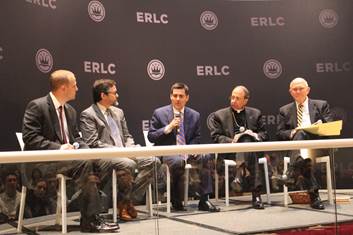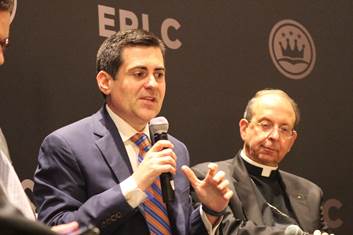
WASHINGTON (BP) — Religious leaders with widely diverse views called for freedom for all faith groups, not just their own, in a May 23 panel discussion sponsored by the Southern Baptist Ethics & Religious Liberty Commission.
Southern Baptist, Roman Catholic, Mormon and Muslim representatives explained to an audience on Capitol Hill why their faith perspectives support universal religious freedom despite the distinctions in their beliefs.
“Our differences are too important to be adjudicated by the state or to be applied through pressure,” said Southern Baptist leader Russell Moore, who explained he thought he could speak for the entire panel in making such an assertion.
Religious freedom, Moore said, is “about having the freedom and the opportunity to be genuinely different, to be able to genuinely respect one another and to be able to have disagreements with one another, including about issues that we believe are of ultimate, ultimate significance, while at the same time saying, ‘These are not matters of coercion, and we do not need a government referee to come and settle those issues.’
“A religion that needs cultural or political pressure behind it,” he said, “is a religion that has lost faith in its deity.”
 The event — titled “Christianity and the Common Good: Religious Liberty and Human Flourishing” — was the latest in the Capitol Conversations series of panel discussions sponsored by the Ethics & Religious Liberty Commission (ERLC). It came at a time in American life when evangelical Christians and Catholics are among those receiving government pressure to violate their beliefs to use their services for same-sex weddings and Muslims are sometimes facing hostility in reaction to terrorist acts by Islamic extremists.
The event — titled “Christianity and the Common Good: Religious Liberty and Human Flourishing” — was the latest in the Capitol Conversations series of panel discussions sponsored by the Ethics & Religious Liberty Commission (ERLC). It came at a time in American life when evangelical Christians and Catholics are among those receiving government pressure to violate their beliefs to use their services for same-sex weddings and Muslims are sometimes facing hostility in reaction to terrorist acts by Islamic extremists.
Each of the panelists explained his faith’s basis for supporting freedom for all religious adherents.
“I am a genuine, creedal, evangelical Christian,” said Moore, the ERLC’s president. “I believe that no one goes to heaven except through explicit faith in Jesus Christ.
“That’s the reason why I don’t think that we ought to be harassing our Muslim neighbors or marginalizing our Muslim neighbors,” he told participants. “We can either love our Muslim neighbors and speak to them or we can scream at them. We can’t do both of those two things at the same time.”
Hamza Yusuf — president of Zaytuna College, a Muslim liberal arts school in Berkeley, Calif. — said the normative Islamic tradition he is a part of teaches: “Every religious tradition is to be treated with human dignity.”
Quoting the ancient saying of an imam, Yusuf said, “People are either your brother in faith or your equal in humanity.”
Dallin Oaks, a member of the Quorum of the 12 Apostles of the Church of Jesus Christ of Latter-day Saints, said religious freedom always has been a “paramount priority” for Mormons.
Citing Jesus’ command to His disciples to love one another, Oaks said Mormons understand “whatever freedom we claim and advocate for ourselves we extend to others.”
“We should walk along the path shoulder to shoulder to secure our ability to go our own way when we come to the intersections we have in our doctrine,” he said.
William Lori, archbishop of Baltimore and chairman of the ad hoc committee on religious liberty of the U.S. Conference of Catholic Bishops, said his church sees religious freedom “as a universal right because it is also a transcendent endowment given to human nature.”
The Catholic Church has a “decidedly international look” at the issue because of the Vatican’s diplomatic relations with countries throughout the world and the church’s dialogue with other religions globally, he said.
Catholics try “to use our freedom to serve the common good,” Lori said.
Evangelicals and other religious adherents can overcome an appearance they are seeking only their own interests by being aware of infringements of others’ freedom, Moore said.
“We need to identify and see where others are receiving pressure and persecution and marginalization, and stand up for one another,” Moore told attendees at the evening event. When a city council in the Bible Belt attempts to bar a mosque, evangelicals need to stand against such government action, he said.
In a world with about 1.6 billion Muslims, “a statistically insignificant number” are violent extremists, Yusuf told the audience gathered in a Capitol Hill hotel. “The Muslims in this country are by and large an extremely law-abiding group.”
About 80 percent of Muslims in the United States do not even practice Islam, Yusuf said. “They are much more American than they are Muslim.”
In an election year in which both of the apparent major party candidates are at least suspect on the issue, advocates for religious freedom face a “massive task” regardless of the election results, Moore said. Religious liberty proponents should “work to build collaborative majorities sometimes issue by issue rather than administration by administration,” he said.
Societies that protect religious freedom do best at serving the needy, often through the work of religious groups, and are more likely to protect other liberties, Ryan Anderson said while speaking as part of a second panel that addressed how religious liberty benefits human flourishing.
Such states also possess more civic harmony, less strife and greater voluntarism, said Anderson, senior research fellow at the Heritage Foundation.
Kristen Waggoner, senior counsel at Alliance Defending Freedom (ADF), said laws adopted after the Supreme Court’s 2015 decision legalizing same-sex marriage and the enforcement of sex discrimination measures are being used “as weapons against the cake baker or the florist” who conscientiously objects to using her talents in support of a same-sex ceremony.
ADF is unaware of any case being litigated in the United States in which an individual “has been denied a good or service simply because they identify as gay or lesbian,” Waggoner said. Alternatives are available in each circumstance in which a florist, baker or photographer objected to providing services for a gay wedding.
Also speaking on the human flourishing panel was John Inazu, associate professor of law and political science at Washington University in St. Louis.
The latest Capitol Conversations event, which was the fifth held in the last 10 months, followed ones on same-sex marriage and religious liberty, Planned Parenthood and the sanctity of human life, the Syrian refugee crisis, and the Supreme Court and abortion.

















